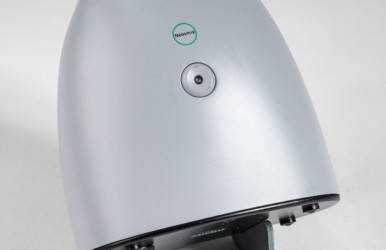Product
Anosmia is a disorder that causes patients to lose their sense of smell. Odors are perceived through orthonasal olfaction; however, the disorder also affects the patient's sense of taste, which is perceived through the mouth (retro-olfaction). Ageusia is a disorder that affects the ability to detect sweetness, saltiness, bitterness, acidity, and umami (savory tastes). Anosmia can be due to trauma, drug treatment, a genetic predisposition, neurodegenerative causes--or the cause can remain unknown. It is estimated that around 1% to 2% of the population (15% of people over age 60 and 70% of people over age 80) suffers from the disorder. Anosmia can also be an early-warning sign of neurodegenerative diseases like Alzheimer's and Parkinson's. The market in Western countries is estimated at 500 million. The disorder often brings with it depression-like symptoms and difficulty eating a balanced diet. The loss of a person's sense of smell also creates safety hazards; sufferers of the disorder cannot smell dangerous odors like gas and smoke, rotting food, and unpleasant or abnormal body or household odors. In general, the disorder is considered to be untreatable. Surgery is only rarely successful. The most treatable forms are due to sinus inflammation, and the side effects of treatment can be debilitating and last for months. Aryballe Technologies developed an odor sensor specifically for people who have lost some or all of their sense of smell. A prototyping project led to the development of a dedicated SPRi chip, a database, and a product prototype. The R&D conducted under the NEOSMIA project led to further advances. A second prototyping project was completed and ten identical prototypes were manufactured and used to test the device's operation in real-world conditions. Patients suffering from anosmia also tested the prototypes. The prototype is currently being scaled-up for manufacturing and the product's commercial release is expected by early 2017.L'histoire du produit
Aryballe Technologies was founded in March 2014 by a group of entrepreneurs and scientists. The company's mission is to combine nanotechnology, biotechnology, IT, and cognitive science to develop breakthrough innovations. Surface Plasmon Resonance imaging (SPRi) for sensory testing, a technique initially patented by the French Alternative Energies and Atomic Energy Commission (CEA) and France's National Center for Scientific Research (CNRS) responds to this need. In the spring of 2014, the technique was successfully used for the first time ever to detect and distinguish between different odors. At the time, the technique had been developed as a laboratory-grade instrument that was cumbersome (dozens of centimeters and 20 kg) and expensive (more than 10K). Therefore, the company's early-stage R&D involved proof-of-concept testing to determine whether or not the sensor could be used universally and work to miniaturize the system leveraging low-cost components. Leti's DTBS lab (which focuses on microtechnology for biology and healthcare) is renowned for its expertise developing innovative systems. Aryballe Technologies drew up specifications and seven months of development work was completed to come up with a small, affordable instrument capable of delivering the same results as the lab-grade instrument used for the proof-of-concept testing. The company turned to CREAB, an INAC lab (CEA-CNRS-Grenoble-Alpes University) for the biochemical functionalization of the optical sensors. Aryballe Technologies coordinated the project and conducted some of the R&D in conjunction with Leti's DTBS and CREAB. These joint R&D projects took place from the fall of 2014 and the spring of 2015. The results positioned Aryballe Technologies to contract out the production of 20 prototypes and sign partnership agreements with healthcare-industry stakeholders. Since then, the company has built up a network of industrial partners through a consortium of seven France-based members under an initiative financed in part by the French Single Interministerial Fund. Aryballe Technologies recently raised 3 million from investors. The company is scaling up the technology for manufacturing and plans to manufacture and sell nearly 10,000 odor detectors, including for people suffering from anosmia, in 2017.
Investissement
R&D: 300K euros / Industrial scale-up: 500K euros / Go-to-market: 1 million euros
Emplois créés
2
Délai de mise sur le marché
24 months
Financeurs
Project financed by the IRT Nanoelec Easytech program, administered by Minalogic
Financeurs publics
Auvergne-Rhone-Alpes Regional Council, Isere General Council, Grenoble Alpes Metropole (The Greater Grenoble Intermunicipal Authority), The City of Grenoble
En collaboration avec
CEA DTBS
La société : Aryballe
Based in Grenoble, France and founded in 2014, Aryballe combines biochemistry, advanced optics and machine learning to mimic the human sense of smell. The company’s premier product offering, NeOse Advance, uses silicon photonics technology to detect, record and recognize odor data, which powers improved decision making for R&D, quality control, manufacturing and end-user experiences. Aryballe Suite, the company’s cloud-enabled software, enables customers to intuitively access and customize analysis of odors based on their unique needs. With operations in France, South Korea and the USA, Aryballe works with global leaders in automotive, food manufacturing and flavor & fragrances.
Year founded
2014

